威廉布莱克《从一颗沙子看世界》(toseeaworldinagrainof
辛波斯卡诗歌《一粒沙看世界》

辛波斯卡诗歌《一粒沙看世界》一粒沙看世界
我们把它称作一粒沙,
但是它并不自称为颗粒或沙子,
它没有名字,依然完好如初,
无论是一般的或别致的、
永恒的或短暂的、
不恰当的或贴切的名字。
我的一瞥、触摸,于它没有任何意义。
它并不能感觉到自己被看见,被触摸。
它坠落于窗台,
这是我们的经验,却不是它的。
为此,这与坠落在其他事物上并无差别,
也无从确定,它已坠落,
或者,还在坠落。
对于湖泊,窗子可以看到美妙的景色,
但是,景色并不会观看自己。
它存在于这个世界,
无色,无形,
无声,无臭,无痛。
湖底并没有底部,
湖边也没有堤岸。
湖水感觉不到自己的湿润或干涩。
对自己而言,波涛,无所谓单数或复数。
波涛将寂静泼溅于自己的喧嚣之上,
在无所谓大或小的卵石上。
这一切都在天空之下,其实不曾有天空,太阳落下,其实一点也没有下沉,
藏于心不在焉的云层,其实也并未藏匿。
风吹皱云层,唯一的理由是,
它在吹。
一秒钟逝去,
第二秒依然是一秒钟,
第三秒。
唯有对我们而言,这才是三秒钟。
时光飞逝,如一名携带紧急讯息的邮差。
但那只不过是我们的比喻。
人物是杜撰的,其匆忙也是假装的,
传递的也不是人的讯息。
胡桑译。
小学生英语诗歌朗诵稿-最新范文
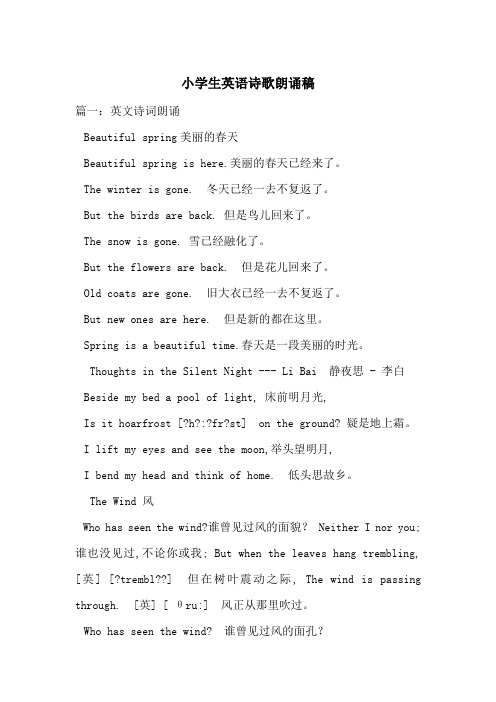
小学生英语诗歌朗诵稿篇一:英文诗词朗诵Beautiful spring美丽的春天Beautiful spring is here.美丽的春天已经来了。
The winter is gone. 冬天已经一去不复返了。
But the birds are back. 但是鸟儿回来了。
The snow is gone. 雪已经融化了。
But the flowers are back. 但是花儿回来了。
Old coats are gone. 旧大衣已经一去不复返了。
But new ones are here. 但是新的都在这里。
Spring is a beautiful time.春天是一段美丽的时光。
Thoughts in the Silent Night --- Li Bai 静夜思 - 李白Beside my bed a pool of light, 床前明月光,Is it hoarfrost [?h?:?fr?st] on the ground? 疑是地上霜。
I lift my eyes and see the moon,举头望明月,I bend my head and think of home. 低头思故乡。
The Wind 风Who has seen the wind?谁曾见过风的面貌? Neither I nor you; 谁也没见过,不论你或我; But when the leaves hang trembling, [英] [?trembl??] 但在树叶震动之际, The wind is passing through. [英] [ θru:] 风正从那里吹过。
Who has seen the wind? 谁曾见过风的面孔?Neither you nor I;谁也没见过,不论你或我; But when the trees bow [英] [b?u] down their heads, 但在树梢低垂之际, The wind is passing by.风正从那里经过。
TheSickRose
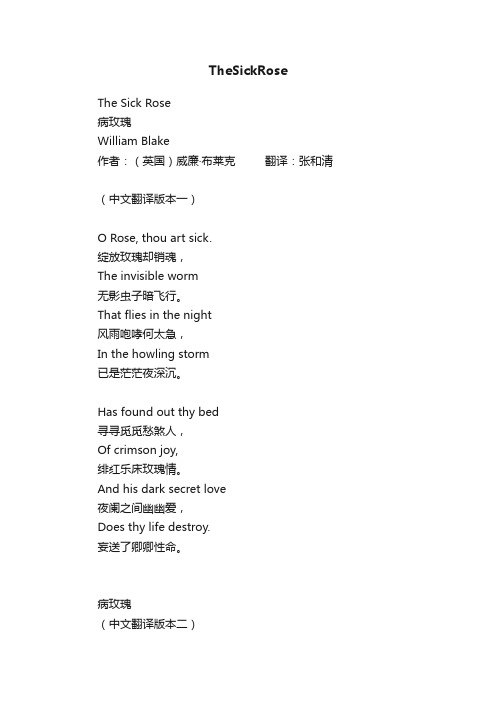
TheSickRoseThe Sick Rose病玫瑰William Blake作者:(英国)威廉·布莱克翻译:张和清(中文翻译版本一)O Rose, thou art sick.绽放玫瑰却销魂,The invisible worm无影虫子暗飞行。
That flies in the night风雨咆哮何太急,In the howling storm已是茫茫夜深沉。
Has found out thy bed寻寻觅觅愁煞人,Of crimson joy,绯红乐床玫瑰情。
And his dark secret love夜阑之间幽幽爱,Does thy life destroy.妄送了卿卿性命。
病玫瑰(中文翻译版本二)玫瑰啊,病倒的玫瑰那无形的飞虫在狂啸的暴风雨中在那沉沉的夜中穿行。
飞虫已找到你绯红色快活的床。
那黑夜隐秘的爱情毁掉了你的生命。
赏析在西方文学中,“玫瑰”一向是美丽爱情的象征,然而布莱克以他独特的方式对传统意象进行改造,赋予新的思想内涵。
从字面上看,《病玫瑰》是一首描写风暴夜一朵玫瑰遭害虫侵袭而夭折的小诗。
其实,诗中的“玫瑰”和“虫子”不仅仅是现实中的一朵花和昆虫,而是意蕴深刻的象征物。
这里“玫瑰”被喻体化了,暗指“女性美”、“爱情”或一种“感官上的快感”。
诗中的“床”既可以指女人的“床”,也可以指“花床”本身。
同样,“绯红色喜悦”内蕴红玫瑰的美丽,也暗含了偷情的欢愉。
诗中的爱情以一种病态出现,病因是那“看不见的虫子”。
全诗暗示由于“黑色隐秘的爱”,爱情不再清纯美丽,丧失了天真和贞洁。
由此看来,诗歌的内涵十分丰富,指向不一。
全诗意蕴深刻,在一定意义上表达了一种“天真”遭“经验”摧残的思想。
威廉.布莱克(1757~182)出身贫寒,14岁时开始学习雕版刻画。
24岁时与凯瑟琳鲍乇结婚,她是文盲,布莱克教她读书识字。
他一生大部分时间生活在贫穷、误解和孤独之中,他的修改桀骜不驯,思想更是不合世俗。
威廉·布莱克的诗
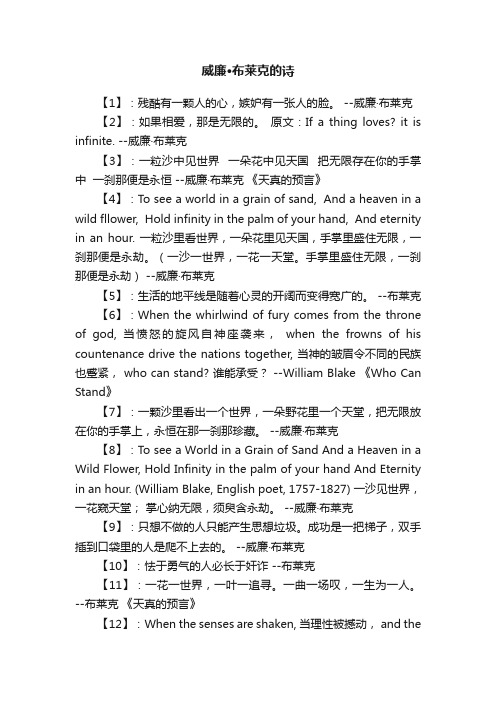
威廉·布莱克的诗【1】:残酷有一颗人的心,嫉妒有一张人的脸。
--威廉·布莱克【2】:如果相爱,那是无限的。
原文:If a thing loves? it is infinite. --威廉·布莱克【3】:一粒沙中见世界一朵花中见天国把无限存在你的手掌中一刹那便是永恒 --威廉·布莱克《天真的预言》【4】:To see a world in a grain of sand, And a heaven in a wild fllower, Hold infinity in the palm of your hand, And eternity in an hour. 一粒沙里看世界,一朵花里见天国,手掌里盛住无限,一刹那便是永劫。
(一沙一世界,一花一天堂。
手掌里盛住无限,一刹那便是永劫) --威廉·布莱克【5】:生活的地平线是随着心灵的开阔而变得宽广的。
--布莱克【6】:When the whirlwind of fury comes from the throne of god, 当愤怒的旋风自神座袭来,when the frowns of his countenance drive the nations together, 当神的皱眉令不同的民族也蹙紧, who can stand? 谁能承受? --William Blake 《Who Can Stand》【7】:一颗沙里看出一个世界,一朵野花里一个天堂,把无限放在你的手掌上,永恒在那一刹那珍藏。
--威廉·布莱克【8】:To see a World in a Grain of Sand And a Heaven in a Wild Flower, Hold Infinity in the palm of your hand And Eternity in an hour. (William Blake, English poet, 1757-1827) 一沙见世界,一花窥天堂;掌心纳无限,须臾含永劫。
世界上最美丽的英文

世界上最美丽的英文 CKBOOD was revised in the early morning of December 17, 2020.《世界上最美丽的英文》世界上最美丽的英文——人生短篇All That Is Beautiful——Poems and Passages of Life闭上眼睛,细数你生命中最美丽的瞬间……在寒冷的日子里接到远方朋友暖暖的问候;读到一篇优美的诗歌,馨香绕怀久久不忘;看到白浪银沙和地平线,第一次来到海边;小雨点与莫扎特的音符一起跳跃在深院中;走在街上,偶然的一景触动了深藏的希望;还有,流星雨划过天际的弧线;还有,夜场电影唤醒的灵感;……这是你的人生,它和四季一样有扬有落,然而当中的美从不逊色。
翻开这本书,它也成为了你的一个瞬间;阅读的快乐,学习的快乐,生之快乐。
Thing do not change; we your clothes and keep your thoughts. 万物不变,是我们在变。
你的衣服可以卖掉,但要保留你的思想。
Henry David Thoreau第一篇:A Grain of Sand一粒沙子William Blake/威廉.布莱克To see a world in a grain of sand,And a heaven in a wild fllower,Hold infinity in the palm of your hand,And eternity in an hour.从一粒沙子看到一个世界,从一朵野花看到一个天堂,把握在你手心里的就是无限,永恒也就消融于一个时辰。
第二篇:Love Your Life热爱生活Henry David Thoreau/享利.大卫.梭罗However mean your life is,meet it and live it ;do not shun it and call it hard is not so bad as youlooks poorest when you are fault-finder will find faults in your life,poor asit may perhaps have some pleasant,thrilling,glorioushourss,even in a setting sun isreflected from the windows of the alms-house as brightly as from the rich man's abode;the snow meltsbefore its door as early in the do not see but a quiet mind may live as contentedly there,and haveas cheering thoughts,as in a town's poor seem to me often to live the most independent livesof be they are simply great enough to receive without think that they are abovebeing supported by the town;but it often happens that theyare not above supporting themselves bydishonest should be more poverty like a garden herb,like nottrouble yourself much to get new things,whether clothes or friends,Turn the old,return to donot change;we your clothes and keep your thoughts.不论你的生活如何卑贱,你要面对它生活,不要躲避它,更别用恶言咒骂它。
细节描写

作文训练----
细节描写
朗读下面几段文字:
1、只听见一声枪响,各国的跨栏运动员们便狂奔 起来,我国运动员刘翔奋力的跨过一个又一个栏 杆,把其他人都甩在了后面,最后刘翔冲到了终 点,夺得了中国第一枚跨栏金牌。 2、世界男子110米跨栏比赛就要开始了,紧张的 蹲在起跑线上的运动员们就像一张张拉满弓的箭, 随着“砰”的一声枪响,刘翔这只离弦之箭向前 飞奔着,只见他挥动着有力的双臂抬腿越过一个 个栏杆,身轻如燕,姿态优美,很快便把对手甩 在身后,闪电般的冲过了终点------
3、记得有一次,爸爸喝醉了,到家很生气, 就开始打人、骂人,就在那天,少年无知的 我被爸爸打了。
4、你听,笔尖在纸上沙沙作响,像春蚕咀 嚼桑叶,又像暖风吹拂白杨,像秋雨轻吻梧 桐,又像泉水叮咚欢唱。笔随着手腕运转, 字随着思路延伸,一个个,一行行,一页页, 横看如群蚁排衙,纵观如阅兵方阵。秀丽, 整洁,赏心,悦目,捧着自己的劳动成果, 你不认为这是一种乐趣吗?
① “难道家里又没人?”
我叹着气无奈地拿出钥匙,对 着该亮灯的窗户抱怨。当我打 开门的一瞬,黑色的空气封住 了我的眼睛。尔后,我竟发现 妈妈坐在餐桌旁,③微弱的烛 光照亮了淡淡的烟雾——她在 抽烟。“停电了吗?为什么其 他人家里亮着灯?”“饭做好 了,快吃吧!”妈妈没有理会 我。 “股票又跌了!”妈妈手 里夹着烟叹着气说,“还没有 交电费。” ②口中吐出的烟 雾向上升腾。影子在墙上匆忙 掠过。 我拿着筷子的手停在半空
“咳!哭什么呢? ”妈妈抚摸着我的脸, 拭去了泪水。我还是哭 了。妈妈说:“我卖掉 房子也会供你上大学的 !大不了就回乡下住! ”我的泪水流了下来, 我说:“那我能给你什 么呢?” 妈妈说 :“我只要 ,你将来还会爱我。” 原来,红色的烛光 就是幸福的颜色
英美文学选读试题详解2
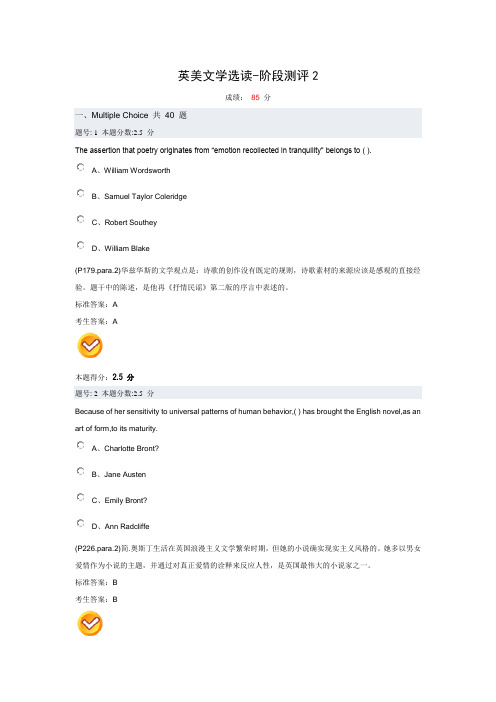
英美文学选读-阶段测评2成绩:85分一、Multiple Choice 共40 题题号: 1 本题分数:2.5 分The assertion that poetry originates from “emotion recollected in tranquility” belongs to ( ).A、William WordsworthB、Samuel Taylor ColeridgeC、Robert SoutheyD、William Blake(P179.para.2)华兹华斯的文学观点是:诗歌的创作没有既定的规则,诗歌素材的来源应该是感观的直接经验。
题干中的陈述,是他再《抒情民谣》第二版的序言中表述的。
标准答案:A考生答案:A本题得分:2.5 分题号: 2 本题分数:2.5 分Because of her sensitivity to universal patterns of human behavior,( ) has brought the English novel,as an art of form,to its maturity.A、Charlotte Bront?B、Jane AustenC、Emily Bront?D、Ann Radcliffe(P226.para.2)简.奥斯丁生活在英国浪漫主义文学繁荣时期,但她的小说确实现实主义风格的。
她多以男女爱情作为小说的主题,并通过对真正爱情的诠释来反应人性,是英国最伟大的小说家之一。
标准答案:B考生答案:B本题得分:2.5 分题号: 3 本题分数:2.5 分English Romanticism,as a historical phase of literature,is generally said to have ended in 1832 with ( ).A、the passage of the first Reform Bill in the ParliamentB、the publication of Wordsworth and Coleridge’s Lyrical BalladsC、the publication of T.S.Elio t’s The waste LandD、the passage of the Bill of Rights in the Parliament(P157.para.1)英国的浪漫主义文学时代开始于1798年,标志性的事件是《抒情民谣》的出版,结束于1832年,标志性的事件是斯格特之死和“改革法案”的通过。
英国文学期末考试题目(英语专业必备)
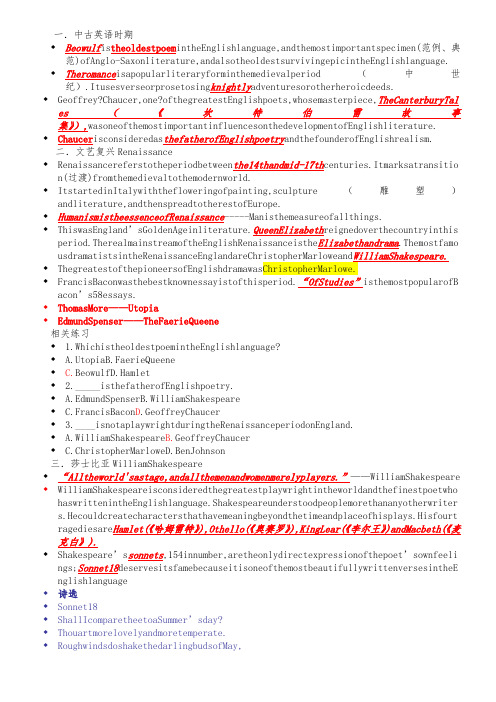
一.中古英语时期♦Beowulf is theoldestpoem intheEnglishlanguage,andthemostimportantspecimen(范例、典范)ofAnglo-Saxonliterature,andalsotheoldestsurvivingepicintheEnglishlanguage. ♦Theromance isapopularliteraryforminthemedievalperiod(中世纪).Itusesverseorprosetosing knightly adventuresorotherheroicdeeds.♦Geoffrey?Chaucer,one?ofthegreatestEnglishpoets,whosemasterpiece,TheCanterburyTal es(《坎特伯雷故事集》),wasoneofthemostimportantinfluencesonthedevelopmentofEnglishliterature.♦Chaucer isconsideredas thefatherofEnglishpoetry andthefounderofEnglishrealism.二.文艺复兴Renaissance♦Renaissancereferstotheperiodbetween the14thandmid-17th centuries.Itmarksatransitio n(过渡)fromthemedievaltothemodernworld.♦ItstartedinItalywiththefloweringofpainting,sculpture(雕塑)andliterature,andthenspreadtotherestofEurope.♦HumanismistheessenceofRenaissance-----Manisthemeasureofallthings.♦ThiswasEngland’s GoldenAgeinliterature.QueenElizabeth reignedoverthecountryinthis period.TherealmainstreamoftheEnglishRenaissanceisthe Elizabethandrama.Themostfamo♦♦FrancisBaconwasthebestknownessayistofthisperiod.“OfStudies”isthemostpopularofB acon’s58essays.♦ThomasMore——Utopia♦EdmundSpenser——TheFaerieQueene相关练习♦ 1.WhichistheoldestpoemintheEnglishlanguage?♦ A.UtopiaB.FaerieQueene♦ C.BeowulfD.Hamlet♦ 2._____isthefatherofEnglishpoetry.♦ A.EdmundSpenserB.WilliamShakespeare♦ C.FrancisBacon D.GeoffreyChaucer♦ 3.____isnotaplaywrightduringtheRenaissanceperiodonEngland.♦ A.WilliamShakespeare B.GeoffreyChaucer♦ C.ChristopherMarloweD.BenJohnson三.莎士比亚WilliamShakespeare♦“Alltheworld'sastage,andallthemenandwomenmerelyplayers.”——WilliamShakespeare ♦WilliamShakespeareisconsideredthegreatestplaywrightintheworldandthefinestpoetwho haswrittenintheEnglishlanguage.Shakespeareunderstoodpeoplemorethananyotherwriter s.Hecouldcreatecharactersthathavemeaningbeyondthetimeandplaceofhisplays.Hisfourt ragediesare Hamlet(《哈姆雷特》),Othello(《奥赛罗》),KingLear(《李尔王》)andMacbeth(《麦克白》).♦Shakespeare’s sonnets,154innumber,aretheo nlydirectexpressionofthepoet’sownfeeli ngs;Sonnet18deservesitsfamebecauseitisoneofthemostbeautifullywrittenversesintheE nglishlanguage♦诗选♦Sonnet18♦ShallIcomparetheetoaSummer’sday?♦Thouartmorelovelyandmoretemperate.♦RoughwindsdoshakethedarlingbudsofMay,♦AndSu mmer’sleasehathalltooshortadate.♦(我怎能将你与夏日相比?/你比它更温和可爱:/动人的花蕾在五月咆哮的风中颤抖,/夏日的美好时光也绝不长久:)♦Sometimetoohottheeyeofheavenshines,♦Andoftenishisgoldcomplexiondimm’d;♦Andeveryfairfromfairsometimedeclines,♦Bychance,ornature’schangingcourse,untrimm’d;♦(太阳的金色光芒虽然耀眼,/却常常以灰暗的面貌出现;/再美貌的物什都逃不过凋谢,/命运流转或无意间将其拆解;)♦ButthyeternalSummershallnotfade,♦Norlosepossessionofthatfairthouow’st♦NorshallDeathbragthouwander’stinhisshade,♦Whenineternallinetotimethougrow’st.♦Solongasmencanbreathoreyescansee,♦Solonglivesthis,andthisgiveslifetothee.♦(可你如夏日般不会褪色,/你的美貌也将永存;/死神无法夸耀你曾在它的阴影中游荡,/伴随永恒的诗篇你将留存。
- 1、下载文档前请自行甄别文档内容的完整性,平台不提供额外的编辑、内容补充、找答案等附加服务。
- 2、"仅部分预览"的文档,不可在线预览部分如存在完整性等问题,可反馈申请退款(可完整预览的文档不适用该条件!)。
- 3、如文档侵犯您的权益,请联系客服反馈,我们会尽快为您处理(人工客服工作时间:9:00-18:30)。
威廉布莱克《从一颗沙子看世界》(to see a world in a grainof...威廉·布莱克《从一颗沙子看世界》(To see a world in a grain of sand)2011-03-17 01:07:08 威廉·布莱克(William Blake)是18世纪末、19世纪初的一个英国诗人,活着的时候没人知道,直到20世纪初才被挖掘出来。
他在国内最出名就是下面四行诗:To see a world in a grain of sandAnd a heaven in a wild flower,Hold infinity in the palm of your handAnd eternity in an hour.这四行诗的中译,我估计至少有二三十种。
下面选贴几种。
一沙见世界,一花窥天堂.手心握无限,须臾纳永恒.——译者不详在一颗沙粒中见一个世界,在一朵鲜花中见一片天空,在你的掌心里把握无限,在一个钟点里把握无穷。
——《布莱克诗集》上海三联,张炽恒译从一粒沙看世界,从一朵花看天堂,把永恒纳进一个时辰,把无限握在自己手心。
——王佐良一花一世界,一沙一天国,君掌盛无边,刹那含永劫。
——宗白华一颗沙里看出一个世界一朵野花里一座天堂把无限放在你的手掌上永恒在一刹那里收藏——《世界上最美丽的英文——人生短篇》但是,这几行诗在欧美并不是那么有名,讲起布莱克的时候,也不把这看作他的代表作。
似乎只有中国人才特别迷恋这几句话,我猜想也许因为这首诗跟佛教思想有相通之处有关系。
这四行诗选自一首长达132行、名为《天真的预兆》(Auguries of Innocence)的长诗,是开头四行。
这首长诗似乎并不重要,没有收在布莱克主要几本诗集里,评论家也不谈,我在网上甚至找不到它是写于哪一年的。
William Blake - Auguries of InnocenceTo see a world in a grain of sand,And a heaven in a wild flower,Hold infinity in the palm of your hand,And eternity in an hour.A robin redbreast in a cage Puts all heaven in a rage.A dove-house fill'd with doves and pigeonsShudders hell thro' all its regions.A dog starv'd at his master's gatePredicts the ruin of the state.A horse misused upon the roadCalls to heaven for human blood.Each outcry of the hunted hareA fibre from the brain does tear.A skylark wounded in the wing,A cherubim does cease to sing.The game-cock clipt and arm'd for fightDoes the rising sun affright.Every wolf's and lion's howl Raises from hell a human soul.The wild deer, wand'ring here and there,Keeps the human soul from care.The lamb misus'd breeds public strife,And yet forgives the butcher's knife.The bat that flits at close of eveHas left the brain that won't believe.The owl that calls upon the nightSpeaks the unbeliever's fright.He who shall hurt the little wrenShall never be belov'd by men.He who the ox to wrath has mov'dShall never be by woman lov'd.The wanton boy that kills the flyShall feel the spider's enmity.He who torments the chafer's spriteWeaves a bower in endless night.The caterpillar on the leafRepeats to thee thy mother's grief.Kill not the moth nor butterfly,For the last judgement draweth nigh.He who shall train the horse to warShall never pass the polar bar.The beggar's dog and widow's cat,Feed them and thou wilt grow fat.The gnat that sings his summer's songPoison gets from slander's tongue.The poison of the snake and newtIs the sweat of envy's foot.The poison of the honey bee Is the artist's jealousy.The prince's robes and beggar's ragsAre toadstools on the miser's bags.A truth that's told with bad intentBeats all the lies you can invent.It is right it should be so;Man was made for joy and woe;And when this we rightly know,Thro' the world we safely go.Joy and woe are woven fine,A clothing for the soul divine.Under every grief and pineRuns a joy with silken twine.The babe is more than swaddling bands;Every farmer understands.Every tear from every eyeBecomes a babe in eternity;This is caught by females bright,And return'd to its own delight.The bleat, the bark, bellow, and roar,Are waves that beat on heaven's shore.The babe that weeps the rod beneathWrites revenge in realms of death.The beggar's rags, fluttering in air,Does to rags the heavens tear.The soldier, arm'd with sword and gun,Palsied strikes the summer's sun.The poor man's farthing is worth moreThan all the gold on Afric's shore.One mite wrung from the lab'rer's handsShall buy and sell the miser's lands;Or, if protected from on high,Does that whole nation sell and buy.He who mocks the infant's faithShall be mock'd in age and death.He who shall teach the child to doubtThe rotting grave shall ne'er get out.He who respects the infant's faithTriumphs over hell and death.The child's toys and the old man's reasonsAre the fruits of the two seasons.The questioner, who sits so sly,Shall never know how to reply.He who replies to words of doubtDoth put the light of knowledge out.The strongest poison ever knownCame from Caesar's laurel crown.Nought can deform the human raceLike to the armour's iron brace.When gold and gems adorn the plow,To peaceful arts shall envy bow.A riddle, or the cricket's cry,Is to doubt a fit reply.The emmet's inch and eagle's mileMake lame philosophy to smile.He who doubts from what he seesWill ne'er believe, do what you please.If the sun and moon should doubt,They'd immediately go out.To be in a passion you good may do,But no good if a passion is in you.The whore and gambler, by the stateLicensed, build that nation's fate.The harlot's cry from street to streetShall weave old England's winding-sheet.The winner's shout, the loser's curse,Dance before dead England's hearse.Every night and every mornSome to misery are born,Every morn and every nightSome are born to sweet delight.Some are born to sweet delight,Some are born to endless night.We are led to believe a lieWhen we see not thro' the eye,Which was born in a night to perish in a night, When the soul slept in beams of light.God appears, and God is light,To those poor souls who dwell in night;But does a human form displayTo those who dwell in realms of day.感谢分享到推荐8人15人喜欢喜欢2011-11-29 10:36:35 老朱(自得为福)一粒沙中看见世界,一朵花中发现天堂,在你掌中拥有无限,在一瞬间握住永远。
